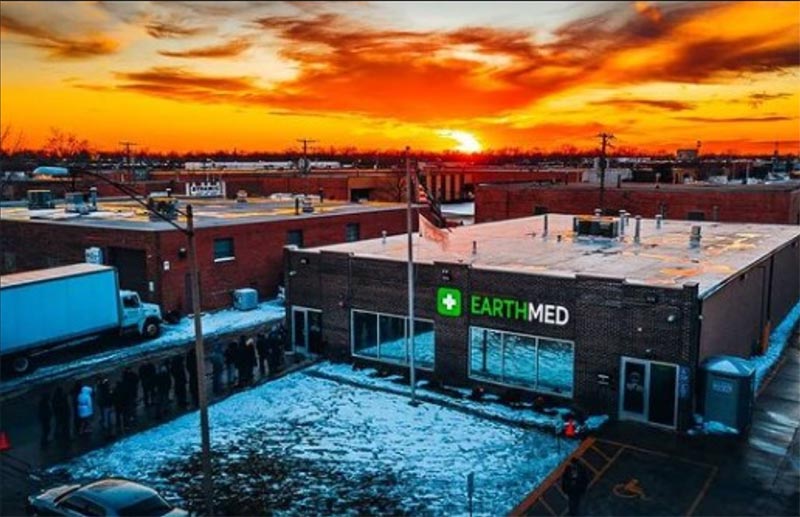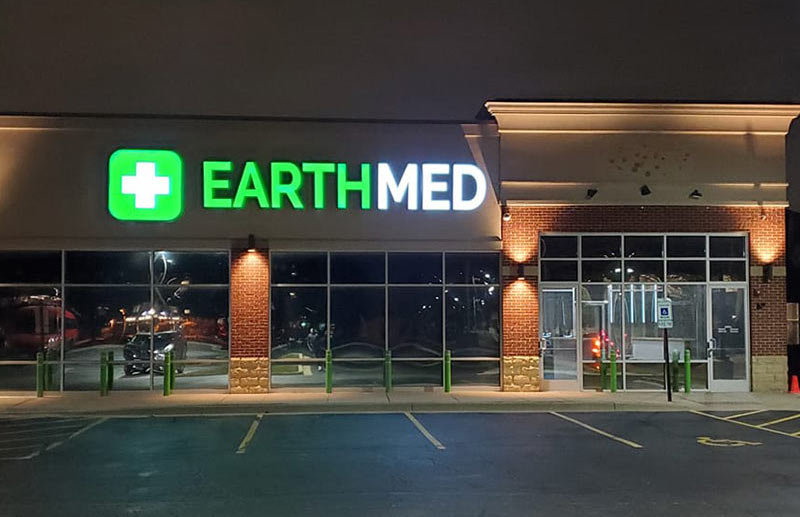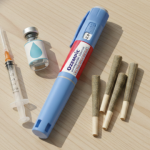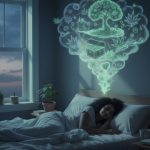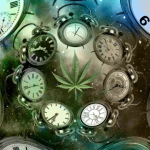Are you at least 21 years of age or hold a valid medical marijuana card?
Daily Specials
{{ special.title }}
{{ special.description }}
*{{ note }}EARTHMED BLOG

Is Weed a Depressant? A Deep Dive into Marijuana and Mental Health
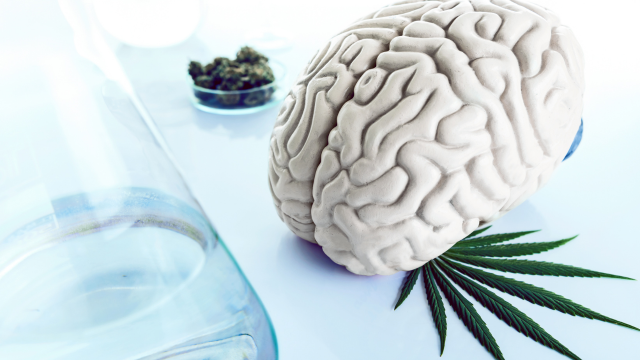
Note: This blog post is for informational purposes only and should not be considered medical advice. Always consult with a healthcare professional before making decisions about your health and wellness.
An honest conversation around marijuana and mental health is long overdue, and often oversimplified. We talk about weed like it’s either a cure-all or a curse—all or nothing. But, like most things, the truth lives somewhere in the messy and complicated middle.
As an Illinois medical marijuana patient, I’ve walked both sides of this story. I use cannabis to help manage anxiety, depression, and other deeply personal aspects of my mental health. It’s not a magic fix, but it’s been an invaluable tool in my wellness kit. That said, I also know cannabis isn’t benign. As with most things, marijuana can help or harm depending on the context, the person, and the way it’s used. So, let’s take a clear-eyed look at what the science actually says, plus a peek at what it doesn’t.
Is Weed a Depressant, Stimulant, or Hallucinogen?
One of the most misunderstood parts of cannabis is how it affects the brain. People often ask: Is weed a depressant? The answer isn’t straightforward. Depending on your unique biology and the strain you're using, cannabis can act like a depressant—slowing things down and quieting a racing brain. It can also feel like a stimulant or, in higher doses, even a mild hallucinogen. This unpredictability is what makes cannabis both intriguing and complex in mental health contexts.
This variability is why two people can smoke a joint together and have wildly different experiences. What soothes one person may send another spiraling down a dark, twisted rabbit hole. If you're using cannabis for mental health support, self-awareness is your best ally. Keep track of how you respond, what strains you use, your method of consumption, and your dosage. It really does make a difference.
Pro Tip: Check out our handy Toke Tracker in our post: Track Your Highs & Whys with Our Printable Toke Tracker.
CBD and Depression: Gentle but Promising
Of all the cannabinoids, CBD is getting the most attention in mental health circles, and for good reason. The idea of using CBD for depression has been explored in several studies, with some suggesting it can help regulate mood by interacting with serotonin receptors. Anecdotally, some patients, myself included, find that CBD offers emotional balance without the high of THC.
On tough days when THC feels too heavy or risky, a balanced 1:1 gummy or CBD-dominant strain can soften the edges of my depression without leaving me foggy or detached. The research is still catching up, but anecdotal support for CBD as a mood stabilizer is growing fast.
Cannabis and Serotonin: A Complex Dance
One key reason cannabis may influence mood lies in the relationship between weed and serotonin, the neurotransmitter often linked to mood, anxiety, sleep, and general well-being. Low doses of THC may boost serotonin release temporarily, while higher doses could disrupt that balance. Understanding how weed and serotonin interact is essential for those using cannabis with mental health goals in mind.
What does that mean for those who struggle with mental health? Essentially, it highlights the importance of moderation and intent. Microdosing or sticking to lower-THC, CBD-balanced strains may offer benefits without tipping the scale too far.
So, Does Weed Help with Depression?
Short answer: sometimes.
Long answer: it depends on who you are, what you’re using, and how you're using it. One 2019 study from the University of New Mexico found that people using whole-plant cannabis flower reported short-term relief from depressive symptoms, sometimes significantly. But relief doesn't always mean resolution—and like any coping tool, cannabis can become problematic if used without awareness or support.
Some patients, including myself, report cannabis depression relief, particularly in the form of reduced anxiety, improved sleep, or fewer intrusive thoughts. I’ve found that cannabis can provide a mental pause—a chance to reset intrusive thoughts or quiet emotional overwhelm. But I also pair it with therapy, meditation, mindfulness, and community. Weed is one piece of the puzzle, not the entire picture. That said, does weed help with depression long-term? That question is still up for debate and likely varies from person to person.
The Risks We Need to Talk About
Here’s where the conversation gets a bit uncomfortable, but necessary. Evidence has shown that in certain cases, cannabis causes mental health issues, especially when used heavily or by individuals predisposed to psychosis or anxiety disorders. This statement is not meant to be fear-mongering; it’s intended as informed caution. As with anything, understanding the risk profile is just as important as knowing the potential benefits.
The CDC points out that frequent cannabis use can worsen depression symptoms over time for some users. If you’re already struggling with mental health challenges, especially those involving psychotic features, cannabis could potentially intensify those issues instead of easing them.
THC + Antidepressants: Know Before You Mix
If you’re on SSRIs or other antidepressants, it's imperative that you are cautious about adding THC to the mix. THC can interfere with how your body processes medications, either reducing their effectiveness or amplifying side effects. This doesn’t mean cannabis is off-limits, but it does mean you need to consult your prescribing doctor before you experiment.
This part gets overlooked way too often, especially when people are desperate for relief. I’ve personally discussed cannabis with my mental health provider to ensure everything I’m doing is aligned, and it’s made all the difference.
Cannabis is a Tool, Not a Solution
Marijuana is not a cure for depression, anxiety, or trauma, but it can be a helpful ally. It’s supported me through some incredibly hard moments, but I’ve also learned to respect its limits. The key is honest self-reflection, intentional use, and professional support when needed. If you're navigating your mental health and considering cannabis, know that you deserve personalized care—not stigma, not guesswork. Start small, stay informed, and treat cannabis with the same seriousness you'd give any other wellness tool or prescription medication.
Mental health is complex. Cannabis is complex. But healing doesn’t have to be lonely or linear. Do you use cannabis for your mental health and wellness? Hit me up on social media, and let’s spark up a conversation about it!
{{ locations[0].name }}
{{ locations[0].address }}{{ locations[0].city }}, {{ locations[0].state }} {{ locations[0].zip }}
{{ locations[0].phone }}
Hours
Sun: {{ locations[0].hours_recreational.Sunday }}Mon: {{ locations[0].hours_recreational.Monday }}
Tue: {{ locations[0].hours_recreational.Tuesday }}
Wed: {{ locations[0].hours_recreational.Wednesday }}
Thu: {{ locations[0].hours_recreational.Thursday }}
Fri: {{ locations[0].hours_recreational.Friday }}
Sat: {{ locations[0].hours_recreational.Saturday }}
{{ locations[1].name }}
{{ locations[1].address }}{{ locations[1].city }}, {{ locations[1].state }} {{ locations[1].zip }}
{{ locations[1].phone }}
Hours
Sun: {{ locations[1].hours_recreational.Sunday }}Mon: {{ locations[1].hours_recreational.Monday }}
Tue: {{ locations[1].hours_recreational.Tuesday }}
Wed: {{ locations[1].hours_recreational.Wednesday }}
Thu: {{ locations[1].hours_recreational.Thursday }}
Fri: {{ locations[1].hours_recreational.Friday }}
Sat: {{ locations[1].hours_recreational.Saturday }}
